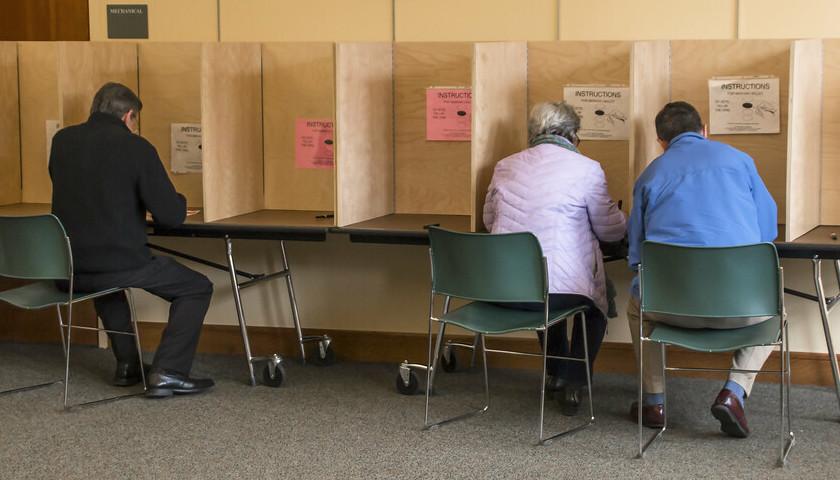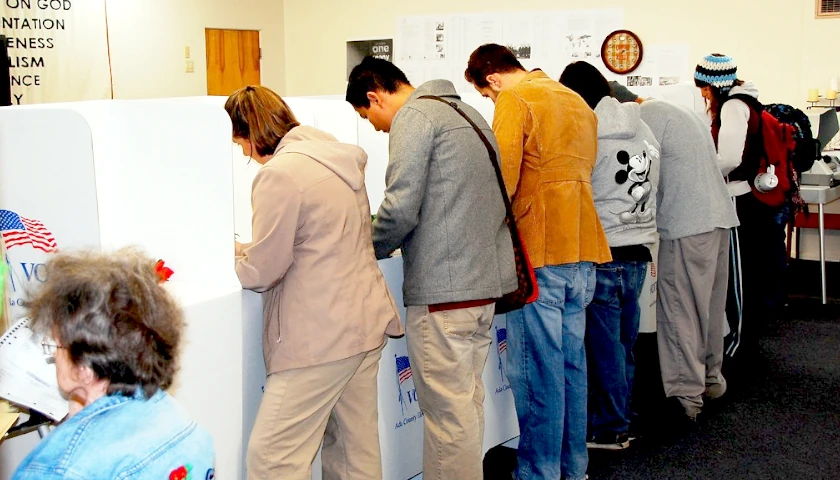The Arizona Free Enterprise Club (AFEC) filed a lawsuit against the Make Elections Fair Act (MEFA) on Friday. The complaint alleged that the initiative violates the Arizona Constitution by illegally combining multiple constitutional amendments in one ballot initiative. It said the “Make Elections (Unfair) Act” will “radically alter Arizona’s constitutional structure in multiple ways.”
“In their rush to undermine the will of Arizona voters for future elections, the special interests that drafted this measure ignored our laws and our Constitution,” said Scot Mussi, president of AFEC in a statement. “This egregious disregard for law and order exudes arrogance from these parties and should disqualify their measure from the November ballot.”
MEFA’s proposed changes include establishing open primaries, ranked choice voting for the general election, ending public funding in partisan primaries, binding future legislatures’ ability to legislate on the number of candidates permitted on the ballot for a given race, and altering Arizona’s separation of powers by expressly directing lawmaking authority to the Arizona Secretary of State.
The complaint accused MEFA, “The Initiative challenged here … contains twelve different amendments, covering not less than three separate and distinct topics of election law, amending four different sections of the Arizona Constitution, and creating an entirely new section of the Arizona Constitution.”
Article XXI, Section 1 of the Arizona Constitution, known as the “Separate Amendment Rule,” states, “If more than one proposed amendment is submitted at any election, the proposed amendments shall be submitted in such a manner that the electors may vote for or against such proposed amendments separately.”
The Arizona Supreme Court clarified in Clean Elections Inst. Inc. v. Brewer what this meant. “When a proposed amendment consists of multiple provisions, the proposal constitutes one amendment under the terms of the constitution only if its provisions ‘are sufficiently related to a common purpose or principle that the proposal can be said to constitute a consistent and workable whole on the general topic embraced, that, logically speaking, should stand or fall as a whole,’” the complaint said.
In Korte v. Bayless, the Arizona Supreme Court held that the purpose of the Separate Amendment Rule “is to eliminate the ‘pernicious practice of log-rolling,’ whereby voters are ‘forced, in order to secure the enactment of the proposition which [they] consider[] the most important, to vote for others of which [they] disapprove.’ … “Log-rolling allows constitutional amendments that garner only minority support to become the law of the land by association, rather than through the endorsement of a majority required by our system of democratic governance.”
The complaint pointed out that some changes would alter the “fundamental structure of the Arizona Constitution.” They include “granting lawmaking powers to the Secretary of State” and “creating a new breed of ‘super statutes’ that are not subject to ordinary amendment by subsequent legislatures, but can instead only be amended by the Legislature every six years.”
AFEC argued that the latter goes against long-standing precedent, “altering the foundational constitutional principle that a given legislature cannot bind future legislatures.” The complaint cited the Arizona Supreme Court case Higgins’ Estate v. Hubbs, which held that “an attempt by one [l]egislature to limit or bind the acts of a future one” is unconstitutional.
In regard to transferring “massive” lawmaking powers to the secretary of state, AFEC stated that it “empower[s] the Secretary to arbitrarily decide how many candidates can advance to the general election for a given office and the procedures for RCV for the General Election — i.e., the ability to legislate.”
The complaint also pointed out that the MEFA would allow the “Secretary to arbitrarily decide the number of eligible candidates.”
The initiative’s official title names multiple parts: “An Initiative Measure Amending Article VII; Section 2 Regarding Political Party Affiliations; Section 4 Regarding Determining Persons Elected; Section 10 Regarding Primary Elections; Section 11 Regarding General Elections; Adding A New Article VII; Section 19 Regarding Funding For Political Party Elections.”
AFEC asked the court to declare that the initiative violates the Arizona Constitution and prohibits it from being placed on the ballot. The group also asked for attorneys’ fees and costs.
AFEC has also filed a lawsuit against MEFA, challenging over half the signatures collected as illegal. Signature gatherers collected nearly 600,000 signatures, more than the 383,000 valid signatures needed to get it on the ballot.
Last year, the Arizona Legislature referred a constitutional amendment to the 2024 ballot that opposes part of MEFA. Proposition 133 would require primary partisan races in Arizona to remain closed.
MEFA’s leadership includes a Democrat, two independents, and a moderate Republican. Its supporters are a mix of the same, including some of the most prominent liberal Democrats in the state, like former Attorney General Terry Goddard and former Tempe Mayor Neil Guiliano. Supporters also include Rusty Bowers, former State House Speaker who was defeated in a landslide in 2022 due to his hostility to election integrity.
There are multiple progressive organizations listed on the website as supporters, including Open Primaries, Grand Canyon Institute, and Business for Democracy.
– – –
Rachel Alexander is a reporter at The Arizona Sun Times and The Star News Network. Follow Rachel on X / Twitter. Email tips to [email protected].
Photo “People Voting” by liz west. CC BY 2.0.





